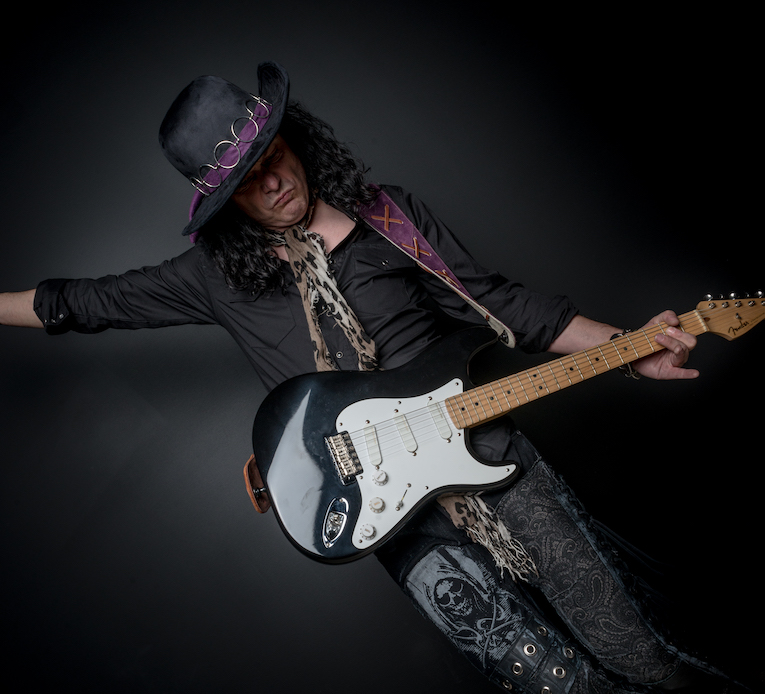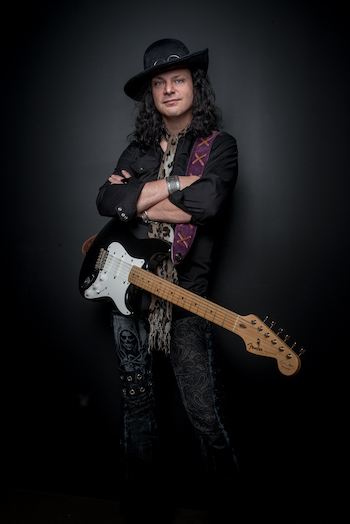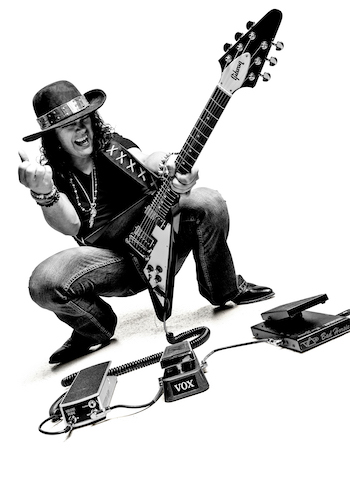
Photo: Anthony Gomes by Stephen Jensen
By Martine Ehrenclou
Toronto native, Blues/rock master guitarist, singer and songwriter Anthony Gomes, is a #1 Billboard Blues Artist, a force on the rocking contemporary blues scene. His high-energy shows and dynamic stage presence make him one of the top draws on the blues/rock circuit today. Guitar World included Gomes in their ‘Top 30 Best Modern Blues Guitarists in the World’ and he was named one of the “Top 10 Guitarists in the World” by Music Tasters Choice. Gomes has earned a number of awards, including “Best Musician/Live Performance Winner” at the 2017 European Blues Awards, and was nominated for a Canadian Maple Blues Awards “Electric Artist of the Year,” and more. His 2018 album Peace, Love & Loud Guitars was named ‘Best Blues Album of 2018’ by Blues Rock Review and SoundGuardian Magazine, and was one of the Top 20 Albums of the Year by Rock and Blues Muse.
Not content to be a highly respected musician with hit albums, Gomes founded ‘Music Is The Medicine Foundation’ to positively impact the lives of others through the healing power of music. He is also an award-winning blues history scholar, and his book The Black and White of Blues was nominated for “Best Book of 2014” by Blues 411.
Anthony Gomes has performed in 17 countries and has opened for B.B. King, Robert Plant, Joe Bonamassa, Heart, Jonny Lang, Sammy Hagar, Robert Cray, Kenny Wayne Shepherd and many more. His new album, Containment Blues, was released October 16, 2020.
Martine: I really enjoyed your new album Containment Blues. It seems a little more bluesy/rootsy than what I’ve heard from you before. Can you tell me about the album?
Anthony: We have another album that’s about 80% done and it’s called Rock and Roll Bluesman. In the springtime, we were putting through the finishing touches on it. It’s a very sassy album, very in your face, and it just didn’t seem appropriate with what was going on. (the pandemic) Because we had this time on our hands, we let the album take its own journey. It started off just as a singer-songwriter, one mic, one acoustic guitar and my voice.
I go for walks in the morning and I meditate. I would sort of channel what I was feeling, come home, write some lyrics and then go into the studio and demo a song. We did that for about a month, and we had about a dozen songs that we really liked. At that point, we thought the singer-songwriter ‘one guitar and voice’ is cool, but these songs were asking for more on them than just that. My producer-manager, he had a few goals. One was that he wanted the guitar playing to be an extension of the voice.
A lot of times, we’re perceived as being a guitar hero kind of thing, and we didn’t want to do that this time. We wanted the songs to speak and the vocals to speak. There’s acoustic on all the songs.
Martine: I really like that about it.
Anthony: Good. There’s a combination. It’s sort of pushed me, Martine. To be honest, when I started, I wasn’t a great acoustic player. But by the end of the process, I worked very hard on it and I really felt like I raised my playing. It also really pushed me vocally. Instead of being dictated by the brand that we are, which is blues/rock, we decided to just push on all sides of creativity and just be what we are, as opposed to a brand. And I’m really satisfied with the results.

Photo: Stephen Jensen
Martine: Speaking of the acoustic guitar, “Until the End of Time” is a beautiful song.
Anthony: Thank you. This pandemic obviously influenced so much on the album. The one thing that really got me is my family lives in Canada and I have some friends in Europe. This is a very obvious statement, but it was a global phenomenon, and it was something that we were all going through. I felt like when we were making this album, I wanted to represent the world on it. We have contributions from artists from Brazil and Venezuela and Sweden and Russia, China-
Martine: That was part of your goal?
Anthony: The goal was to create a world sound within the blues. I’ve always believed that the blues is music for the world. It started in Mississippi, but the testament of the music is that it’s grown and it’s touched people all over the world. People have different accents or nuances in their playing in different places, and I wanted to bring that together.
We found these musicians who could bring something to the table. We have a wonderful violinist and viola player. She plays on “Until the End of Time” and “This Broken Heart of Mine.” It pushed my playing into a different place because I was responding to that influence. I just thought it was a very cool experiment, and it was wonderful to have these people.
Martine: You also brought some humor into Containment Blues too, like on the title track.
Anthony: We need to laugh, right? These are tough times. I’ve always looked at music as a vehicle for bringing the world together and for unity. That’s always been a big mission statement. And to break down barriers artistically, socially. In any way that we have a division, it’s sort of music’s job to reduce those divisions and make everyone realize that we have a lot of common ground. Now I realize that humor is a great device because it disarms people. When you want to put a serious point forth, it’s always great after you tell a joke because it’s unexpected and everybody is a bit more relaxed, as opposed to banging on the pulpit. They’ll run screaming.
Martine: What woman wouldn’t love your song, “Stop Calling Women Hoes and Bitches.” Can you tell me about it?
Anthony: Usually the weirdest songs that I think I’ll never record, end up being everybody’s favorites for whatever reason. I’m old school. I’m a mama’s boy and I think that women are God’s greatest creation. I think that women are beautiful, wonderful people. They’re half of the human race. I believe in equality and in human rights. It just pisses me the hell off when I’m listening to music or hearing people refer to women in that way. Even people who I may respect artistically or people who I really respect personally and I hear them speak that way. It’s been bothering me forever. Maybe I’m just old school.
On this album, there was sort of a “I’m going to sing about what I want to sing about.” At first, I thought, this is going to raise some certain censorship issues on how we promote the record. I was like, “You know what, I have to do this. It’s so important.” Why in 2020 are we letting silly dumb things continue to flourish?
Martine: That song was refreshing, and you were so in it.
Anthony: Thank you. I never sang a song exactly that way. It was like I was singing it for the first time, but with 20 years of experience, I just feel like enough is enough. Jay-Z said that he’s going to stop using those words, but it’s time, man. It’s time. You may not have respect for yourself, but don’t project that onto others.
Martine: There’s a killer guitar solo in it too.
Anthony: Thank you. To humbly state it, the thing I love about that song is the guitar range. There’s acoustic. There’s delta slide. Then there’s like a melt-your-face-off Hendrix thing. It’s got a lot of multiple personality disorder, but in a fun and honest way.
Martine: The other song, “Let Love Take Care,” has beautiful lyrics. My interpretation of it was about letting go. Is your belief that love is at the center of everything?
Anthony: Thank you, yes. Love is the beginning and the end. It’s so strange because the Beatles wrote, “All You Need is Love.” People have been writing about love since the beginning of time. I guess it’s just a message that we have to be reminded about. As a human being and with the evolution of things, you think, “Well, isn’t that path well-worn already? Isn’t there enough of a catalog and a canon of songs with this message?” But at the same time, I think it’s basic humanity. Even practicing guitar, the fundamentals are so important. I think the fundamentals of existence, of life, of spirituality, of interpersonal connection, are all based on love.
We were talking about having the courage to write that other song, but with love, it’s sometimes having the courage to let go. There’s a time to be behind the wheel and there’s a time to ride shotgun.

Photo: Stephen Jensen
Martine: You founded ‘Music is Medicine Foundation.’ Can you tell me about that?
Anthony: When I was about 12 years old, my mom was diagnosed with paranoid schizophrenia. My dad had a smaller real estate company, and the guy that worked for my father ended up killing people. This is in the ’80s in Toronto when there were like 30 murders a year. He was also Canada’s most wanted man for over a decade.
My father and him had a disagreement, and there was a lot of fear that he would sort of come for us. My mom was crippled by this ailment and my life had turned 180 degrees. Music is what got me through that.
Music was the parent that couldn’t be there at the time. After we had a bit of success, I wanted to be able to help people, enable people to be helped through music in the way that it had helped me. Very humbly in the beginning, doing small steps as opposed to giant leaps, we started to help some folks. We donated some guitars to war veterans with post-traumatic stress disorder. We helped kids with autism.
We provided music and music players at St. Jude’s Hospital for kids. Then a friend of mine in Montreal who works in the medical profession said, “You’re not going to believe this. There is a choir of mentally ill people and they record albums and do gigs.” So, we raised enough money to buy them a PA system so they didn’t have to rent it when they did gigs. It was such a moving thing. We made a presentation and there wasn’t a dry eye in the room. The way these people sing, it was with so much passion.
Martine: I can imagine.
Anthony: Martine, it reminded me of what is important about music. None of these people are professionals. Here we are wondering how many tickets we sold for Kansas City, and are we going to chart on Billboard, and how many records are we selling, and are we getting good press? But that’s not really what music is about. Music is about healing and changing the world. These people reminded me of that.
As much as I have given, I have been given back 10 times by the amount of inspiration and the gratitude. Nothing really feels as good as doing good deeds.
We were doing instruction classes for Guitar for Vets and one guy had not spoken since the Gulf War. All of a sudden, they’re being taught a Jimi Hendrix song, and he goes to the guy next to him, “Can you show me how you did that?”
Martine: Wow.
Anthony: It opened up the pathway to communication. We all know that music is a language. Somehow there was a bridge for this person.
Martine: How has it been for you with COVID and staying home?
Anthony: It’s changed so many things. For the first time in my life, I understand what having an at-home routine is like because I’ve been a touring musician my whole life. Coming home used to mean paying bills, being exhausted, hanging out with a girlfriend, whatever. Now it is like, “Oh, it’s Friday night. It’s Saturday night.” There’s a routine when you’re not gone for a long period of time. I’ve embraced the routine. I’ve really enjoyed it.
But on a personal level, it’s really pushed me as a person and as an artist. Pushed me to develop new skills and survive in these crazy times. I think that when we do get back out there, I know for myself, I feel like I’ll be a better artist, a deeper artist and very grateful for all the positive things that this has brought.
There’s of course, the downside of all these people being impacted and 200,000 deaths. Then us musicians–I’ve had two paychecks since March. It’s a tough time. But I think in life, you have a choice. I believe in making the best of a situation even if it’s not ideal and you find a way to make that situation work as best as possible. I’ve never worked harder.
My feeling is we might have a cultural renaissance from this because as artists, we’re allowed to have a little bit of time to ourselves. Sometimes, that’s a great thing for an artist and other times it’s not. But I really feel like we could have an overall deeper and better outcome. I’m excited for that. I’m excited for people to be healthy and for things to get back to a more normal, everyday life.
Martine: Thank you so much for taking the time to talk with me today.
Anthony: Well, thank you. I just want to say a quick thank you for all you do for the blues and music community.
Martine: My pleasure.
Anthony: Be safe and healthy.
Martine: Thank you, you too.
For more information on Anthony Gomes:

Read this as we’re waiting for Anthony to take the stage at knuckleheads in KC. Excellent interview with an outstanding artist! Much love
Mary,
How fun! Enjoy the show. Yes, he is an excellent artist. Thanks for commenting.
Enjoyed reading this interview Martine. I am so impressed to learn that not only is Anthony a brilliant musician, but a humanitarian as well!
Melanie,
Thanks. I had the same response! Thanks for your comment.
Thank you for an interesting interview and greetings from Anthonys’ fans in Finland!
What a wonderful interview Martine! Thank you both for everything you do for blues music!